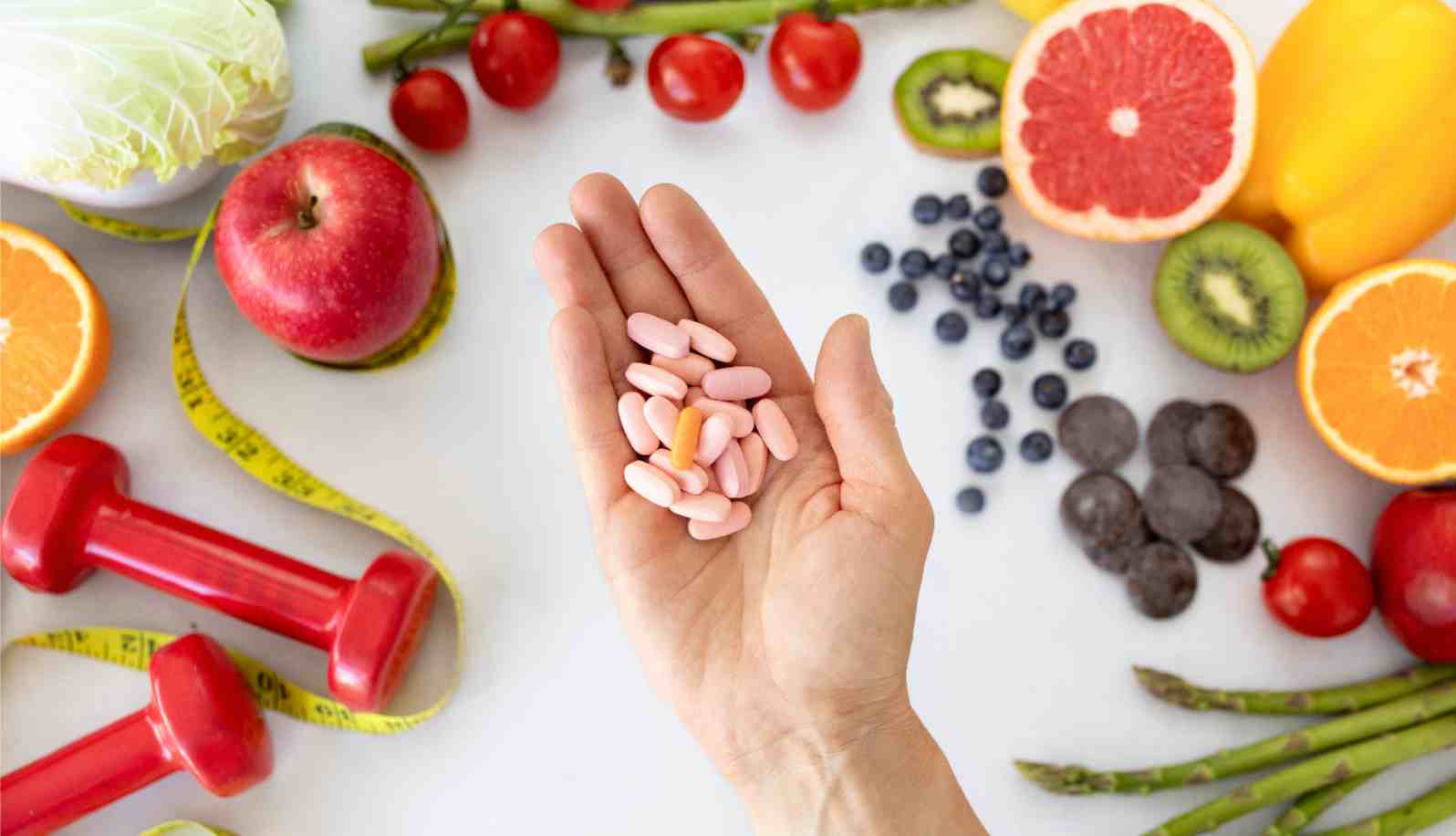7 Important Vitamins for Eye Health & Which Vitamin is Good for Eyes

Vitamins are small organic molecules needed in tiny quantities for growth and metabolism. They are naturally absorbed into the body from foods such as fruits and vegetables. Moreover, they are vital for good health. Additionally, doctors recommend taking vitamins to lower the chances of eye conditions due to poor nutrition.
So, which vitamins are suitable for the eyes?
Some vitamins are required to improve eyesight, keep eyes moist, prevent night blindness, and maintain overall eye health. Check them out below!

Table of Contents

Essential Vitamins for Healthy Eyes
Essential vitamins support eye structure and function and limit the chances of age-related ailments like macular degeneration and cataracts. This section discusses some vital vitamins that are necessary for maintaining healthy eyes.
1. Vitamin A

Undoubtedly, vitamin A (retinol) is well known as an essential vitamin for good eyesight. Vitamin A is a part of the protein rhodopsin, which is present in the retina's rods. This protein is responsible for low-light vision.
In foods with beta-carotene, vitamin A can be obtained naturally from colourful fruits and vegetables like carrots, pumpkins, and bell peppers. Retinol is a vitamin which is essential for good eyesight. However, the deficiency of this vitamin is rare in developed countries.
|
Vitamin A |
Uses |
|
Role and function of vitamin A |
Component of protein rhodopsin, Responsible for low light vision, Helps maintain a clear cornea and May reduce the risk of cataracts, It may also reduce the risk of age-related macular degeneration (AMD) |
|
Diseases and conditions that vitamin A can help to cure or prevent |
Xerophthalmia, Night blindness, Drying up of eyes and tear ducts, Softening of the cornea |
|
How does vitamin A protect the eyes from future diseases and keep them healthy? |
Retinol reduces the risk of age-related macular degeneration and vision loss, and it helps strengthen immunity and prevent eye infections. |
Rich Sources of Vitamin A:
- Food - Broccoli, carrots, eggs, fish, orange and yellow vegetables and fruits, spinach and other leafy veggies
- Fruits - Orange or yellow fruits
- Liquid - Cod liver oil, skimmed milk
- Tablet - Aquasol A, Retinox A, etc.
2. Vitamins B1

Thiamine, a vitamin that promotes the healthy functioning of the eyes, has been shown to reduce cataracts and diabetic retinopathy. Moreover, a study in Australia proved that an increase in thiamine reduced the risk of developing cataracts. Thiamine is found in whole food grains, meat, and fish.
Finally, vitamin B1 can be consumed orally or naturally. Doctors recommend 1.2 mg for men and 1.1 mg for women.
|
Vitamin B1 |
Uses |
|
Role and function of vitamin B1 |
B1 plays an important role in proper cell function, Also, it helps in converting food to energy |
|
Diseases and conditions that vitamin B1 can help to cure or prevent |
Reduces the risk of cataracts, Diabetic retinopathy in Type 2 diabetic patients |
|
How does vitamin B1 protect the eyes from future diseases and keep them healthy? |
If a person takes vitamin B1, it reduces the albumin amount in the body, an indicator of Type 2 diabetes. |
Rich Sources of Vitamin B1:
- Food - Peas, nuts, whole grains, liver, fortified breakfast cereals, yeast, beef, cauliflower, eggs, asparagus
- Fruits - Bananas, oranges
- Tablet - Mecorol, Ferobex, Bexsil, etc.
3. Vitamin B2

Vitamin B2, riboflavin, is found in oats, milk, yoghurt, and beef. It is known to reduce cataracts. In addition, it also helps to reduce oxidative stress in the eyes as it is among the well-known antioxidants. Hence, as a vitamin which is good for the eyes, incorporate this health booster into your diet.
Doctors recommend the consumption of 1.1 to 1.3 mg of riboflavin per day. Fortunately, the above-mentioned foods are rich in vitamin B2. Hence, the vitamin can be taken in naturally.
|
Vitamin B2 |
Uses |
|
Role and function of vitamin B2 |
An antioxidant that reduces oxidative stress to the eye, Deficiency may lead to cataracts |
|
Diseases and conditions that vitamin B2 can help to cure or prevent |
Prevents cataracts |
|
How does vitamin B2 protect the eyes from future diseases and keep them healthy? |
It helps prevent cataracts and damage to the lens of the eye. |
Rich Sources of Vitamin B2
- Food - Yoghurt, cheese, eggs, salmon, chicken, organ meats, beef and pork
- Liquid - Milk
- Tablet - Riboflavin
4. Vitamin B3

Niacin, a vitamin good for the eyes, is another popular antioxidant. It helps convert food to energy. In addition, Niacin plays a role in preventing glaucoma. Glaucoma is a condition where the optic nerve is damaged.
However, there is a problem. Excessive consumption of Niacin can be dangerous. It may cause blurred vision, macular damage, and corneal inflammation. Hence, taking Medications is discouraged. Instead, taking in the vitamin through foodstuffs is recommended. Foods rich in vitamin B3 such as beef, fish, legumes should be consumed instead.
|
Vitamin B3 |
Uses |
|
Role and function of vitamin B3 |
Niacin's main function is to convert food to energy. |
|
Diseases and conditions that vitamin B3 can help to cure or prevent |
Glaucoma |
|
How does vitamin B3 protect the eyes from future diseases and keep them healthy? |
It can help prevent glaucoma, as certain studies have shown. |
Rich Sources of Vitamin B3
- Food - Anchovies, tuna, beef, turkey, chicken breast, salmon, pork, liver, nuts, legumes, brown rice, whole wheat
- Fruit - Avocado
- Tablet - Niacin, Zincovit
5. Vitamins B6, B9, B12

A mix of these vitamins is necessary to promote good eye health. In addition, this vitamin combination can reduce levels of homocysteine, which is responsible for inflammation and putting you at risk for developing AMD.
The research on these vitamins is still in the nascent stage. Hence, it has not been fully proven whether this vitamin helps eyesight. However, you can try it, as one study on women showed a reduced risk of AMD when a combination of vitamins B6, B9, and B12 was consumed.
Moreover, a 2017 study found that B12 is a vitamin for dry eyes. B12 supplements and artificial tears were useful for treating dry eyes. Even vitamin A and D are useful for preventing dry eyes.
|
Vitamin B6, B9, B12 |
Uses |
|
Role and function of vitamin B6, B9, B12 |
In combination, these vitamins can lower homocysteine, B12 is needed for the proper development of nerve cells. |
|
Diseases and conditions that vitamin B6, B9, B12 can help to cure or prevent |
These help to prevent a variety of diseases unrelated to the eye. They also play an important role in reducing inflammation of the eye and AMD. |
|
How does vitamin B6, B9, B12 protect the eyes from future diseases and keep them healthy? |
Helps prevent inflammation and AMD and helps prevent dry eyes. |
Rich Sources of Vitamin B6, B9, B12
- Food - Salmon, leafy greens, sunflower seeds, yoghurt, trout, pork, chicken, turkey, legumes, oysters, clams, eggs, liver and other organ meats
- Fruit - Citrus foods, avocado, banana
- Liquid - Milk
- Tablet - Nervz B, B long
6. Vitamin E

Vitamin E is indeed the best vitamin that gradually improves eyesight. Sufferers from AMD reported a 25% reduction in AMD progressing to the next stage just by consuming vitamin E supplements. Vitamin E is also an antioxidant that protects the eyes from damage because of free radicals.
Vitamin E rich foods such as nuts, cooking oils, salmon, etc., are recommended for good eye health.
|
Vitamin E |
Uses |
|
Role and function of vitamin E |
Acts as an antioxidant, Protects the eyes from free radicals |
|
Diseases and conditions that vitamin E can help to cure or prevent |
AMD (age-related macular degeneration), Age-related cataracts |
|
How does vitamin E protect the eyes from future diseases and keep them healthy? |
It is an antioxidant that protects the eye from damage by free radicals. It helps prevent cataracts because of old age. |
Rich Sources of Vitamin E
- Food - Cooking oils like sunflower oil, soybean etc., almonds, peanuts, beet greens, spinach, pumpkin, red bell peppers
- Fruit - Avocado, mango, kiwi, olives, black currants, blackberries
- Tablet - Fitvit-E
7. Vitamin C

Vitamin C also protects your eyes from free radical damage. It is also useful in preventing AMD (age-related macular degeneration). Moreover, vitamin C is required for the production of collagen. Collagen helps to maintain the structure of the cornea and sclera.
Furthermore, vitamin C, a vitamin useful for the eyes, can be found in foods such as citrus and tropical fruits.
|
Vitamin C |
Uses |
|
Role and function of vitamin C |
Production of collagen for maintaining the cornea and sclera structure Reduces the risk of developing cataracts, Antioxidant |
|
Diseases and conditions that vitamin C can help to cure or prevent |
Cataracts: Prevent further progression of age-related macular degeneration |
|
How does vitamin C protect the eyes from future diseases and keep them healthy? |
Vitamin C is an antioxidant that nullifies the effect of free radicals, helps produce collagen to strengthen the eye, and reduces the risk of developing cataracts. |
Vitamin E improves eyesight naturally, and vitamins A, K, E, B3, C, and B12 are good for dark circles. Apart from these vitamins, omega-3 fatty oils and Lutein and Zeaxanthin are also useful for improving overall eye health.
Rich Sources of Vitamin C:
- Food - Peppers, broccoli, potatoes, Brussels sprouts
- Fruit - Citrus fruits like oranges, strawberries, blackcurrants
- Tablet - Limji CZ
Recommended Daily Vitamin Intake for Men and Women for Good Eye Health
Understanding which vitamins are good for the eyes, it's time to look at the recommended daily intakes for men and women.
Men and women have different average BMIs, requirements and health needs, so they have different daily dosage recommendations. Check them out below. However, as a cautionary, consult a doctor for the recommended level.
| Vitamin Name | Recommended Daily Dose |
| Vitamin A | 700 µg a day (men), 600 µg a day (women) |
| Vitamin B1 | 1mg a day (men), 0.8mg a day (women) |
| Vitamin B2 | 1.3mg a day (men), 1.1mg a day (women) |
| Vitamin B3 | 16.5mg a day (men), 13.2mg a day (women) |
| Vitamin B6, B9, B12 | B6 1.4mg a day (men) 1.2mg a day (women), B9 Adults need 200 micrograms of folate a day., B12 Adults need 1.5 micrograms a day of vitamin B12. |
| Vitamin E | 4mg a day (men), 3mg a day (women) |
| Vitamin C | 40mg of vitamin C a day |
Useful Tools to Track Your Health
Side Effects of Excess Vitamins on Your Body
An excessive amount of vitamins can have harmful effects on the body. Here is a list!
Vitamin Name |
Side Effects of Excess Vitamins |
| Vitamin A | Too much vitamin A can cause bone fractures and weak bones, and can be harmful to pregnant women |
| Vitamin B1 | Minimal research was done on the subject |
| Vitamin B2 | Minimal research was done on the subject |
| Vitamin B3 | Too much nicotinic acid causes skin flushes and may lead to liver damage |
| Vitamin B6, B9, B12 | B6 Taking too much B6 (more than 200 mg) can lead to peripheral neuropathy, and B9 Folic acid of more than 1 mg can mask vitamin B12 deficiency. Eventually, it can damage the nervous system, B12 Not enough evidence |
| Vitamin E | Not enough evidence |
| Vitamin C | Taking over 1000mg of vitamin C daily can cause stomach pain, flatulence, and diarrhoea. The symptoms stop when you give up your vitamin C intake. |
Dietary and Lifestyle Tips for Eye Health
Eye health care isn’t just about routine examinations. You can preserve your sight and avoid eye diseases by consuming a balanced diet, exercising regularly, maintaining proper hydration, wearing protective gear against UV light and not smoking.
- A Balanced Diet: To maintain eye health, having a diverse diet that provides essential nutrients the body needs is important. Consume fruits and vegetables with high content of vitamins C, A, and E, among others.
- Regular Exercise: This is because it reduces blood pressure by expanding blood vessels in the eyes. Daily walks, jogging sessions, biking expeditions, yoga exercises, etc., are suitable for your eyes.
- Adequate Hydration: Dehydration causes dry eyes, which irritate you. This problem can be solved by drinking water regularly all day to keep the moisture in your eyes.
- Protection from UV Light: The sun’s rays may also harm your vision, causing AMD and cataracts. When outside, wear sunglasses that can block 100% UVA and UVB.
- Avoiding Smoking: Smoking tends to be harmful to the health of the eyes and can escalate the vulnerability of various eye problems, such as macular degeneration and cataracts. However, quitting smoking can lower the chances of these diseases and improve eye health.
Supplements and Their Role in Eye Health

Even though getting a balanced diet is the best approach to acquiring crucial nutrients for the body, supplements might sometimes be needed for better eye care. People with diets that do not meet dietary needs or certain medical conditions impairing nutrient absorption may find nutrition helpful.
To choose well, one must first know which supplements are most beneficial for eye health. Some essential nutrients to look for are vitamins A, C and E.
Supplements may be helpful but can also be unsafe when not taken appropriately. Excessive consumption of some of them often results in toxicity and adverse effects. Adhere to prescribed doses and seek medical counsel to avoid possible adverse outcomes from supplement use.
In conclusion, vitamins A, B, C, and E are good for the eyes. However, before taking any of these, always consult a doctor, as taking them in excess could cause many complications. So keep those peepers sparkling and healthy with vitamins!
We hope you enjoyed knowing which vitamin is best for your eyes!
Protect What Matters - Explore Other Insurance Options














